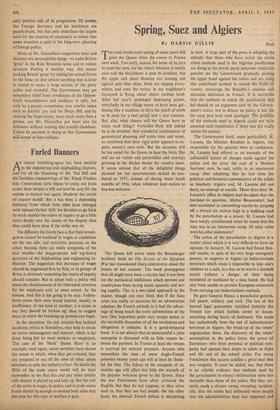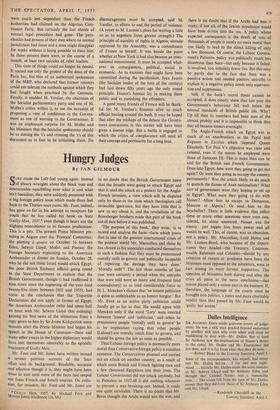Spring, Suez and Algiers
By DARSIE GILLIE
!,? Paris
PTIFIE most lovely early spring of many years will I greet the Queen when she comes to France next week. Too early, indeed, for some of its joys to meet her eyes, for the cherry blossom is nearly over and the blackthorn is past its loveliest; but the apple and plum blossom are coming out against pale blue skies; birds are singing every- where, and even the turkey in my neighbour's farmyard is flying about above rooftop level. After last year's prolonged depressing winter, everybody in my village seems to have been gar- dening like a madman to htiVe his patch otearth in fit state for a real spring' and a real summer. But, alas; what chartee will 'the Queen have to enjoy such things? Versailles 'Park 'Will indeed be at its loveliest, that wonderful combination of geometrical planning and noble trees and Water, so combined that their rigid order appears to ex- press nature's own wish: But the occasion will be too social for the Queen to hear the birds. She will see no violets and periwinkles and cowslips growing in the ditches beside the country lanes. It seems unkind that all the delightful things planned for her entertainment should be pro- duced in 1957,. instead. of 'during those-harsh months- of 1956, when whatever kept nature at bay was welcbme.'
The Queen will arrive when the Bromberger brothers' book on The Secrets of the Egyptian ,War has reawakened sharp controversy about the events of last summer. The book presupposes that all might have been a success had it not been for the puritanical inhibitions which prevent our countrymen from facing issues squarely and act- ing rapidly. This is a one-sided approach to the matter, though one may think that if the Suez crisis was really an occasion for an adventurous solution, the French attitude to it had the advan- tage of being much the more adventurous of the two. One important point may escape notice in the inevitable discussion of all the revelations and allegations it contains. It is a good-tempered book. It is not always that so unsuccessful a joint enterprise is discussed with so little venom be- tween the partners. In France at least the venom is reserved for internal purposes. Anyone who remembers the tone of some Anglo-French polemics twenty years ago will at least be thank- ful for that. The failure of the escapade of six months ago will affect but little the warmth of the popular welcome given to the Queen. Since the war Frenchmen have often criticised the English, but they do 'not suppose, as they often used to, that they are bad people. On the other hand, the internal French debate is sharpening in tone. A large part of the press is adopting the attitude that those who have raised the Marin about methods used in the Algerian pacification are doingSo for'purely party purposes; enalicioits persons see the government gradually gaining the upper hand against the rebels and are using this underhand method to snatch the` frilitS"Of victory, encourage the Republic's enemies and stimulate defeatis'm in France. It is inevitable that the methods' to which the pacification had led should be an argument used by' the GOVern- ment's critics, but in debate On poliCy-it, has' fOr the most Part been used sparingly. The prohrelth of the methods used in Algeria could .not haN'T assumed such importanee &there was dot really matter for anxiety.'
The Government itself, more partithlarlY Lacoste, the Minister Resident in Algiers, was responsible for the greatest blow to confidence. M. Lacoste had offered as an example of the unfounded nature of charges made against the police and the army the case of a Moslem barrister, now, he said, safely in an internment camp after admitting that he had, been 'the political and,finarttiali representative of the rebels in. Southern Algiers ' and; M. Lacoste did not deny, an 'attempt at suicide. Three days later M. LicosteS office in Algiers had to)admit that the barrister, in question, Maitre Boumendzel, had now succeeded 'in committing 'suicide by jumpifig off a terrace six storeys high in a building used by the parachutists as a prison. M. Lacoste had been totally misinformed when he stated thavthe man was in an internment camp. Of what value were his other statements?
The action of the parachutists in Algiers is a matter about which it is very difficult, to form an opinion. In January, M. Lacoste had 'found hini- self unable, in spite of his very large emergency powers, to suppress in Algiers an'indiscriminate terrorism which made it impossible to take ones children to a café, in a bus or to watch a football match without a danger of their beitig murdered or mutilated by a time bomb. He had also been unable to prevent European extremists from carrying out indiscriminate reprisals.
He gave General Massu, a parachutist general, full power, military and civil. The last of the normal legal guarantees vanished (notably the French law which forbids arrest or house- searching during hours of darkness). The result has undoubtedly been the end of indiscriminate terrorism in Algiers, the break-up of the rebels' organisation there, the discovery of the rebels' accomplices in the police force, the arrest 'of Europeans who from personal or political syrn- pathy had opened their doors to rebels in flight and the end of the schork strike. For many Frenchmen this success justifies a great deal that was irregular. It must be added, too, that there is no reliable evidence that methods used by the parachutists to extract information were 'less desirable than those of the police. But they cer- tainly made a cleaner sweep, revealing, incident- ally, that the rebels had infiltrated more deeply into the administration than was supposed and were, much 'less dependent than the French authorities had claimed on the Algerian Com- munist Party. But certainly • the last shreds of normal legal procedure had gone. The para- chutists had prisons of their own where no normal jurisdiction had force and a man might disappear for weeks without it being possible to trace him. In those prisons there were, in the course of a month, at least two suicides of rebel leaders.
This state of things could no longer be denied. It roused not only the protest of the dean of the Paris bar, but that of an authorised spokesman of the MRP, who declared that former resisters could not tolerate the methods against which they had fought when practised by the Germans. Finally, it enabled M. Verdier, the chairman of the Socialist parliamentary party and one of M. Molters critics within it, to use the occasion of proposing a vote of confidence in the Govern- ment as one of warning to the Government. It was an unpleasant surprise for M. Mollet and his Ministers that the Socialist spokesman should be so dotting the 'i's and crossing the 't's of this document as in fact to be criticising them. No discouragement must be accepted, said M. Verdier, to efforts to end, the period of violence. (A retort to M. Lacoste's pleas for waiting a little so as to negotiate -from greater strength.) The principle of equality of rights in Algeria, already approyed by the Assembly, was a commitment of France to herself. It was beside the point whether at New York it had alsobecome an inter- national commitment. It must be accepted what- ever its consequences, political, social or economic. As to excesses that might have been committed during the pacification, Jean Jaures (the Socialist leader of the turn of the century) had laid down fifty years ago the only sound principle. France's honour lay in making them public and in punishing the offenders.
A good many friends of France will be thank- ful for M. Verdier's firmness after so much official beating around the bush. It may be hoped that after the mishaps of the debate the Govern- ment instructions in this matter will have been given a keener edge. But a battle is engaged in which the critics of complacence will need all their courage and pertinacity for a long time.













































 Previous page
Previous page